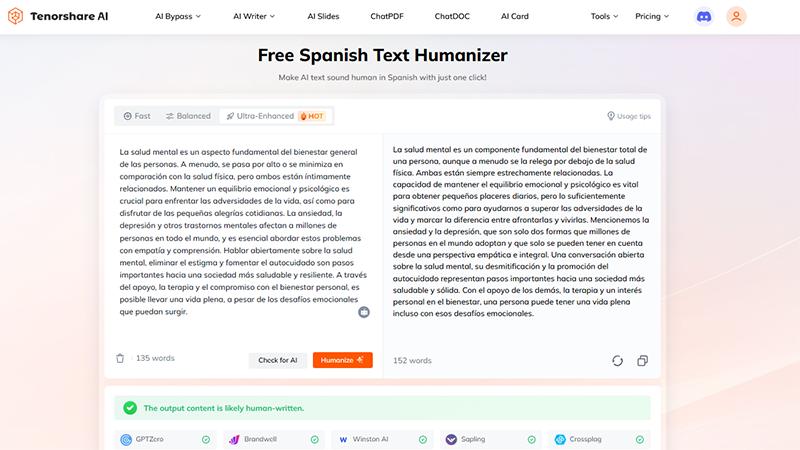How to Humanize AI-Generated Content in Spanish and Pass Detection Tools
Have you ever felt that AI-generated content in Spanish lacks the personal touch or fails to pass AI detectors? For students and researchers, this can be especially frustrating. Whether you're working on academic reports, research papers, or other important documents, AI detection tools can flag your content, jeopardizing your credibility and hard work.
Addressing these issues is essential to ensure your AI-generated Spanish text is not only authentic and relatable but also able to bypass AI detection with confidence. This article will guide you how to humaniz e AI content in Spanish .
Why Is It Important to Humanize AI Content in Spanish?
Challenges with AI Content
AI tools can generate large volumes of text quickly, but they struggle to create content that sounds human-like and relatable, especially for diverse audiences like Spanish speakers.
Bypassing AI Detectors
Humanized AI content is more likely to pass through AI detectors because it closely mirrors natural human writing, making it harder to identify as AI-generated. This is particularly crucial for academic reports and research papers, where maintaining a genuine, scholarly tone is essential to avoid detection and ensure credibility.
Avoiding False Positives in AI Detection
By adding human-like qualities to AI content, the risk of AI detection tools wrongly flagging the content as machine-generated (false positives) is reduced, ensuring the content is seen as more authentic.
How to Humanize AI Content in Spanish
Method 1: Manually Humanizing
Incorporating Local Idioms and Expressions
One of the best ways to humanize AI content is by adding local expressions and idioms commonly used in Spanish-speaking regions. Phrases like "estar en las nubes" (to be daydreaming) or "ser pan comido" (to be a piece of cake) can make the text feel more authentic. This method helps ensure that the content resonates with specific Spanish-speaking audiences.
Adapting the Tone and Style
Depending on the intended audience, adjusting the tone is crucial. For example, in Spain, a more formal tone might be expected, while in Latin America, a casual and friendly tone may be more appropriate. Tailoring the voice to fit the audience ensures the content feels genuine.
Personalizing the Content
Adding a personal touch, such as storytelling, humor, or informal phrases, can make the content feel more human. Including anecdotes or using conversational language helps establish a connection with readers.
Using Emotional Language
AI content can sometimes be too neutral or factual. Introducing emotionally charged words can help engage the reader's emotions, creating a deeper connection with the content.
Method 2: Using Spanish Text Humanizers

Manually humanizing AI content can be time-consuming and may not always guarantee that the content will pass AI detectors. To overcome this, using Tenorshare AI’s Spanish Text Humanizer offers a more efficient solution.
This AI-powered tool refines the generated content to make it sound more authentic and human-like, adjusting sentence structure, vocabulary, and tone to align with the expectations of native Spanish speakers.
Most importantly, it is capable of passing through up to 10 powerful AI detection tools on the market, making it a reliable choice for creating content that remains undetectable as AI-generated.
What Are Popular Spanish AI Detectors?
Spanish AI detectors are tools designed to analyze content and determine whether it was generated by AI or a human writer. These tools are essential for ensuring the authenticity of content, especially when trying to pass off AI-generated text as human-written. They are particularly useful for checking whether content has been sufficiently humanized.
GPTZero
GPTZero is a widely used AI detector that analyzes the complexity and predictability of the text. It can identify AI-generated patterns in Spanish content and flag text that lacks human-like characteristics.
Writer.com
Writer’s AI detection tool can distinguish between human and AI-generated text. It analyzes sentence structure, complexity, and style, helping ensure that the content is natural and authentic in Spanish.
Turnitin
Turnitin , traditionally known for plagiarism detection, now includes AI detection features. It can identify AI-generated content by analyzing writing patterns and comparing them to a vast database of academic sources, making it especially useful for academic papers and research documents.
CopyLeaks CopyLeaks is a popular tool for detecting AI-generated content. It uses advanced algorithms to identify unnatural patterns in text and compares it to a database of AI-generated writing, making it an effective tool for detecting Spanish AI content in both academic and non-academic contexts.
Final Thoughts
Humanizing AI content in Spanish is both a challenge and a necessity in today's digital landscape. Whether by incorporating regional idioms, adjusting tone and style, or using advanced tools like Spanish AI Humanizers , the goal remains the same: to create content that resonates with readers and maintains authenticity.
Additionally, understanding and addressing the limitations of AI detectors ensures the content remains credible and undetectable as machine-generated. By blending technological efficiency with human creativity, writers can unlock the full potential of AI-assisted content creation in Spanish.
Tenorshare AI Bypass
- Create 100% undetectable human-like content.
- Bypass All Al detector tool like GPTZero, ZeroGPT, Copyleaks, etc.
- Original content, free of plagiarism and grammatical errors.
- One-Click AI bypass with a clean and easy-to-use interface
You Might Also Like
- Tenorshare AI Bypass: Comprehensive Review, Features, Pros and Cons
- Top 12 AI Humanizers To Make Undetectable and Human-like Text
- Do Companies Use AI Detectors for Checking Your Cover Letters? - Bypass AI Detection Tips
- How to Bypass ZeroGPT for Free? Best Solutions!
- Do Colleges Check for AI in Application Essays? Here’s the Answer
- Can Grammarly Be Detected as AI?
- Can Teachers Tell If You Use ChatGPT? 2026 Update
- 8 Best AI Content Detectors Reviewed for Teachers in 2026
- How to Bypass GPTZero AI Detector: Effective Strategies for Undetectable AI Text
- 11 Best Free Undetectable AI Writer to Bypass AI Detectors in 2026

